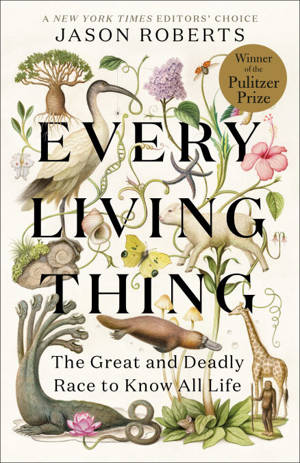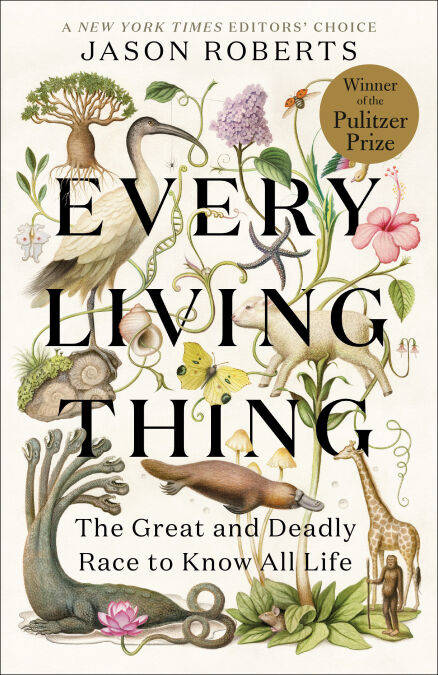
Bedankt voor het vertrouwen het afgelopen jaar! Om jou te bedanken bieden we GRATIS verzending (in België) aan op alles gedurende de hele maand januari.
- Afhalen na 1 uur in een winkel met voorraad
- In januari gratis thuislevering in België
- Ruim aanbod met 7 miljoen producten
Bedankt voor het vertrouwen het afgelopen jaar! Om jou te bedanken bieden we GRATIS verzending (in België) aan op alles gedurende de hele maand januari.
- Afhalen na 1 uur in een winkel met voorraad
- In januari gratis thuislevering in België
- Ruim aanbod met 7 miljoen producten
Zoeken
€ 17,34
+ 17 punten
Uitvoering
Omschrijving
PULITZER PRIZE WINNER • An epic, extraordinary account of scientific rivalry and obsession in the quest to survey all of life on Earth
“[An] engaging and thought-provoking book, one focused on the theatrical politics and often deeply troubling science that shape our definitions of life on Earth.”—The New York Times
“A fluent and engaging account of the eighteenth-century origins of Darwinism before Darwin.”—The Wall Street Journal
WINNER OF THE PEN/E.O. WILSON LITERARY SCIENCE WRITING AWARD • A KIRKUS REVIEWS BEST BOOK OF THE YEAR
In the eighteenth century, two men—exact contemporaries and polar opposites—dedicated their lives to the same daunting task: identifying and describing all life on Earth. Carl Linnaeus, a pious Swedish doctor with a huckster’s flair, believed that life belonged in tidy, static categories. Georges-Louis de Buffon, an aristocratic polymath and keeper of France’s royal garden, viewed life as a dynamic swirl of complexities. Each began his task believing it to be difficult but not impossible: How could the planet possibly hold more than a few thousand species—or as many could fit on Noah’s Ark?
Both fell far short of their goal, but in the process they articulated starkly divergent views on nature, the future of the Earth, and humanity itself. Linnaeus gave the world such concepts as mammal, primate, and Homo sapiens, but he also denied that species change and he promulgated racist pseudoscience. Buffon formulated early prototypes of evolution and genetics, warned of global climate change, and argued passionately against prejudice. The clash of their conflicting worldviews continued well after their deaths, as their successors contended for dominance in the emerging science that came to be called biology.
In Every Living Thing, Jason Roberts weaves a sweeping, unforgettable narrative spell, exploring the intertwined lives and legacies of Linnaeus and Buffon—as well as the groundbreaking, often fatal adventures of their acolytes—to trace an arc of insight and discovery that extends across three centuries into the present day.
“[An] engaging and thought-provoking book, one focused on the theatrical politics and often deeply troubling science that shape our definitions of life on Earth.”—The New York Times
“A fluent and engaging account of the eighteenth-century origins of Darwinism before Darwin.”—The Wall Street Journal
WINNER OF THE PEN/E.O. WILSON LITERARY SCIENCE WRITING AWARD • A KIRKUS REVIEWS BEST BOOK OF THE YEAR
In the eighteenth century, two men—exact contemporaries and polar opposites—dedicated their lives to the same daunting task: identifying and describing all life on Earth. Carl Linnaeus, a pious Swedish doctor with a huckster’s flair, believed that life belonged in tidy, static categories. Georges-Louis de Buffon, an aristocratic polymath and keeper of France’s royal garden, viewed life as a dynamic swirl of complexities. Each began his task believing it to be difficult but not impossible: How could the planet possibly hold more than a few thousand species—or as many could fit on Noah’s Ark?
Both fell far short of their goal, but in the process they articulated starkly divergent views on nature, the future of the Earth, and humanity itself. Linnaeus gave the world such concepts as mammal, primate, and Homo sapiens, but he also denied that species change and he promulgated racist pseudoscience. Buffon formulated early prototypes of evolution and genetics, warned of global climate change, and argued passionately against prejudice. The clash of their conflicting worldviews continued well after their deaths, as their successors contended for dominance in the emerging science that came to be called biology.
In Every Living Thing, Jason Roberts weaves a sweeping, unforgettable narrative spell, exploring the intertwined lives and legacies of Linnaeus and Buffon—as well as the groundbreaking, often fatal adventures of their acolytes—to trace an arc of insight and discovery that extends across three centuries into the present day.
Specificaties
Betrokkenen
- Auteur(s):
- Uitgeverij:
Inhoud
- Aantal bladzijden:
- 448
- Taal:
- Engels
Eigenschappen
- Productcode (EAN):
- 9781984855213
- Verschijningsdatum:
- 8/04/2024
- Uitvoering:
- E-book
- Beveiligd met:
- Adobe DRM
- Formaat:
- ePub

Alleen bij Standaard Boekhandel
+ 17 punten op je klantenkaart van Standaard Boekhandel
Beoordelingen
We publiceren alleen reviews die voldoen aan de voorwaarden voor reviews. Bekijk onze voorwaarden voor reviews.









